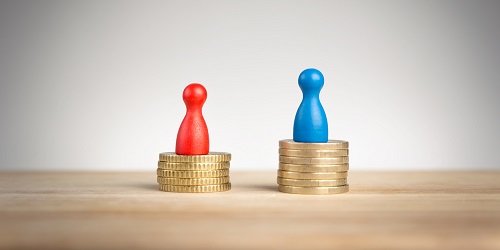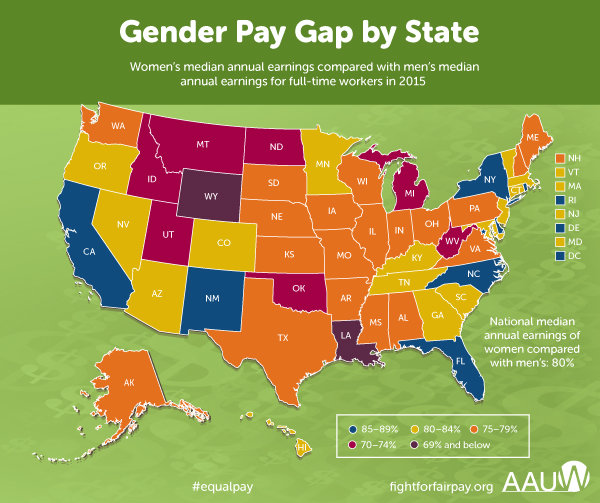 Florida - The Sunshine State's doing better than the rest of the nation when it comes to the gender pay gap, but there's still plenty of work to be done to reach pay equality.
"What we've found this year is that there's a pay gap between men and women in the country as a whole of 80%," said Dr. Catherine Hill, Vice President of Research at the American Association of University Women (AAUW). "In Florida, we see that pay gap is at 87%. So Florida is actually doing pretty well compared to the nation as a whole." That means nationwide, women, on average, are making $0.80 to every $1 being made by their male counterparts. In FL, it's $0.87 to every $1. In FL, median earnings for men are at $41,105 compared to $35,604 for women, according to AAUW.
FL has been ranked #3 out of all states and the District of Columbia due to this earnings ratio. New York takes the top spot, and Wyoming has the worst pay gap in the country.
AAUW uses US census data to come up with its statistics. Dr. Hill says over time there has been a lot of gains for women, especially in the 80's and 90's, but that growth has slowed down recently.
Kate Nielson, State Policy Analyst with AAUW, says there's a lot people can do to help reinvigorate the gains that have been made over the past decades to reach pay equity. "There has been equal pay bills offered each of the last several sessions in Florida, but they've stalled at the committee level," she said. "It would be great to apply pressure to your elected representatives to try to get those bills through." Nielson pointed out 2 specific bills that would greatly help the fight for pay equity.
"If we could pass the Federal Pay Check Fairness Act we would close a lot of loopholes and help a lot of women and families achieve pay equity," said Nielson. The Pay Check Fairness Act is an update to the Equal Pay act of 1963. Among other things, the bill would stop employers from retaliating against employees who discuss wage information, it would make employers who violate sex discrimination laws liable, and it would start programs to train women to better negotiate salaries.
Also, there's a new bill at the federal level that was just recently introduced which prohibits employers from relying on salary history. Many employers set wages based on the previous salary of an employee, so this bill would help women and minorities who frequently start out with salaries below their male counterparts and are never able to catch up.
With a little bit of self-reflection, businesses can also help the cause by volunteering to do pay audits. This exposes pay practices and how fairly employees are being compensated. Then companies can act on any pay discrepancies that are found. It's illegal to lower the salary of someone else to reach pay equity, so these pay audits tend to result in pay raises for women and minorities who aren't being paid as much as their white male counterparts.
"No woman can negotiate out of discrimination," said Nielson. "But getting better at salary negotiation is one way that on a day to day basis women can help themselves. We see that women often don't negotiate as frequently as men or when they do they're penalized for it." Dr. Hill agreed that women can face a backlash if they try to negotiate their salaries because it's not considered "proper" for women to be aggressive when it comes to money. But women need to negotiate otherwise they're going to face lower pay.
For fact sheets and rankings, click here.
For a fact sheet on the pay gap in FL, click here.
To download the updated Simple Truth About The Pay Gap report, which includes details on the impact of the pay gap on different groups of women, click here.
Florida - The Sunshine State's doing better than the rest of the nation when it comes to the gender pay gap, but there's still plenty of work to be done to reach pay equality.
"What we've found this year is that there's a pay gap between men and women in the country as a whole of 80%," said Dr. Catherine Hill, Vice President of Research at the American Association of University Women (AAUW). "In Florida, we see that pay gap is at 87%. So Florida is actually doing pretty well compared to the nation as a whole." That means nationwide, women, on average, are making $0.80 to every $1 being made by their male counterparts. In FL, it's $0.87 to every $1. In FL, median earnings for men are at $41,105 compared to $35,604 for women, according to AAUW.
FL has been ranked #3 out of all states and the District of Columbia due to this earnings ratio. New York takes the top spot, and Wyoming has the worst pay gap in the country.
AAUW uses US census data to come up with its statistics. Dr. Hill says over time there has been a lot of gains for women, especially in the 80's and 90's, but that growth has slowed down recently.
Kate Nielson, State Policy Analyst with AAUW, says there's a lot people can do to help reinvigorate the gains that have been made over the past decades to reach pay equity. "There has been equal pay bills offered each of the last several sessions in Florida, but they've stalled at the committee level," she said. "It would be great to apply pressure to your elected representatives to try to get those bills through." Nielson pointed out 2 specific bills that would greatly help the fight for pay equity.
"If we could pass the Federal Pay Check Fairness Act we would close a lot of loopholes and help a lot of women and families achieve pay equity," said Nielson. The Pay Check Fairness Act is an update to the Equal Pay act of 1963. Among other things, the bill would stop employers from retaliating against employees who discuss wage information, it would make employers who violate sex discrimination laws liable, and it would start programs to train women to better negotiate salaries.
Also, there's a new bill at the federal level that was just recently introduced which prohibits employers from relying on salary history. Many employers set wages based on the previous salary of an employee, so this bill would help women and minorities who frequently start out with salaries below their male counterparts and are never able to catch up.
With a little bit of self-reflection, businesses can also help the cause by volunteering to do pay audits. This exposes pay practices and how fairly employees are being compensated. Then companies can act on any pay discrepancies that are found. It's illegal to lower the salary of someone else to reach pay equity, so these pay audits tend to result in pay raises for women and minorities who aren't being paid as much as their white male counterparts.
"No woman can negotiate out of discrimination," said Nielson. "But getting better at salary negotiation is one way that on a day to day basis women can help themselves. We see that women often don't negotiate as frequently as men or when they do they're penalized for it." Dr. Hill agreed that women can face a backlash if they try to negotiate their salaries because it's not considered "proper" for women to be aggressive when it comes to money. But women need to negotiate otherwise they're going to face lower pay.
For fact sheets and rankings, click here.
For a fact sheet on the pay gap in FL, click here.
To download the updated Simple Truth About The Pay Gap report, which includes details on the impact of the pay gap on different groups of women, click here.

(Map courtesy AAUW)
Photo courtesy ibreakstock and Shutterstock.com.
Copyright Southern Stone Communications 2016.